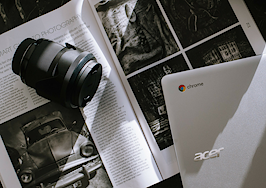A federal district court in Texas has ordered a small Houston-based real estate brokerage to shell out $28.8 million for copyright infringement and violations of the Digital Millennium Copyright Act (DMCA) — a judgment the brokerage says threatens its survival. The case illustrates a potential hazard for other brokerages: not closely following copyright agreements in their marketing materials.
On May 20, 2016, architectural design firm Preston Wood & Associates filed a lawsuit against UL, Inc. (which does business as Urban Living) and its CEO Vinod Ramani, as well as other defendants, followed by an amended complaint in February 2017.
Preston Wood and Urban Living had entered into a licensing agreement in 2014 that allowed the latter to reproduce and modify certain architectural works and technical drawings and to construct and sell the buildings depicted.
But Preston Wood alleged Urban Living failed to comply with certain terms of the agreement, creating and distributing derivates of the copyrighted works without including Preston Wood ‘s copyright management information — such as Preston Wood’s title block and copyright notices — as required.
So Preston Wood filed suit, alleging that Urban Living’s creation and distribution of marketing materials in the form of floor plans, elevations drawings and renderings for multiple housing developments infringed on Preston Wood’s copyrights.
In July 2018, after a five-day trial, a jury found in favor of Preston Wood on all counts. Last week, on Nov. 8, U.S. District Judge David Hittner upheld the jury’s finding that Urban Living had violated the DMCA 11,516 times.
“The evidence submitted at trial showed that Urban Living’s marketing material — containing material that allegedly violated the DMCA — was on its website and distributed by email,” Hittner said in his order.
“There was testimony by Ramani at trial that Urban Living sent out between 8,000 to 15,000 emails containing these materials. Viewing the record in favor of upholding the jury verdict, the Court finds there was sufficient evidence at trial to support the jury’s finding as to the number of DMCA violations.”
Consequently, Hittner ordered Urban Living and Ramani to pay Preston Wood $28.79 million in statutory damages — $2,500 for each violation.
In an emailed statement, Urban Living’s appellate counsel Aaron Streett of Baker Botts LLP said, “The district court entered an unprecedented award of $28 million in damages in a case where the jury found less than $8,000 in actual harm to the plaintiff. We are filing post-judgment motions in district court, and we are confident that the Fifth Circuit will give careful consideration to our appeal of both the liability and damages finding.”
In an emergency motion dated Nov. 9, Streett and co-counsel Justin Strother of Strother Law Firm asked the court to stay the execution of the judgment pending their post-judgment motions. They stressed Urban Living’s annual net profits of $300,000 in 2017 as well as the brokerage’s employment of about 40 people and its owner. (According to the Texas Real Estate Commission, 11 sales agents and a designated broker hang their shingle at Urban Living.)
“Due to Defendants’ lack of liquid assets and the size of the judgment, execution of the judgment would result in Defendants’ having to cease business operations and those employees losing their jobs,” Streett and Strother wrote.
“In a case where statutory damages are thousands of times actual damages, it would be particularly unfair to allow the company to be destroyed before the Court even rules on post0-judgment motions.”
Streett and Strother also said that if the brokerage were forced to pay now, it would hurt its existing creditors.
“As participants in the real estate business, many of Defendants’ assets are encumbered by financing and other agreements with various third parties,” they wrote.
“Permitting execution of the judgment now would upset those arrangements and destroy Defendants’ ability to do business and thereby generate the revenue needed to satisfy both its existing creditors and the judgment.”
According to the motion, Urban Living and Ramani plan to apply to the court for a reduced bond amount to stay execution of the judgment while they appeal it.
“Unless and until the Court grants a reduced bond that Defendants can post, Defendants are powerless to stop the imminent destruction of their real estate business and the substantial harm to their employees and creditors that will ensue,” Streett and Strother wrote.
The motion asks the court to issue the stay before Nov. 22, when an automatic 14-day stay expires.
Preston Wood has named Urban Living as a defendant in at least four other copyright infringement lawsuits. Counsel for Preston Wood did not respond to requests for comment by publication time.












